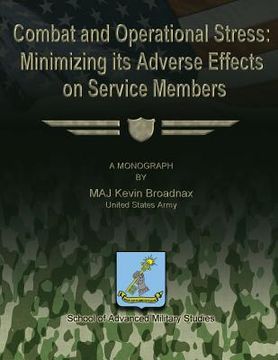Compartir
Combat and Operational Stress: Minimizing its Adverse Effects on Service Members (en Inglés)
United States Army Maj Kevin Broadnax
(Autor)
·
School Of Advanced Military Studies
(Contribuciones de)
·
Createspace Independent Publishing Platform
· Tapa Blanda
Combat and Operational Stress: Minimizing its Adverse Effects on Service Members (en Inglés) - Studies, School Of Advanced Military ; Broadnax, United States Army Maj Kevin
$ 519.38
$ 865.64
Ahorras: $ 346.26
Elige la lista en la que quieres agregar tu producto o crea una nueva lista
✓ Producto agregado correctamente a la lista de deseos.
Ir a Mis Listas
Origen: Estados Unidos
(Costos de importación incluídos en el precio)
Se enviará desde nuestra bodega entre el
Lunes 29 de Julio y el
Martes 06 de Agosto.
Lo recibirás en cualquier lugar de México entre 1 y 3 días hábiles luego del envío.
Reseña del libro "Combat and Operational Stress: Minimizing its Adverse Effects on Service Members (en Inglés)"
Stress and stressors are an inherent part of warfare because of the violence, the physical conditions, and duration of operations. It has been studied and documented that some stresses are good for an individual because they improve performance. Stress represents "the mobilization of the body and mind to counteract stressors." It can be positive or negative. A stressor is any event or situation that requires an unusual change in the way a person responds. This study looks at why the military is reactive in its battle against combat and operational stress and how it can become proactive. The study examines not only the adverse impact on a soldiers' performance in a stressful combat or operational environment, but it also addresses the individual's ability to function once he/she is no longer in a stressful combat or operational environment. Early identification at the onset of short-term effects provides a window to properly treat and minimize the negative effects of handle Combat and Operational Stress (COS). It has become evident that more attention is being given to service members that return from combat with PTSD. However, a more effective use of resources can be achieved by providing a basic education which identifies what combat and operational stress is and how we can minimize its short and long- term negative effects. This in turn can minimize the number of service members that need to be treated for long-term medical conditions that develop because of COS. This study examines how we can better prepare U.S. service members to handle Combat and Operational Stress. This paper addresses ways to minimize the adverse effects of COS. Adverse refers to physical, mental, and emotional manifestations; loss of personnel due to combat ineffectiveness; misconduct stress behavior; and other short- and long-term conditions produced by combat stress. These adverse effects are known as maladaptive stress reactions. To determine this a few questions are asked. What has the military done in the past concerning combat stress and was it successful? What does current military doctrine say about combat stress and how effective is that doctrine? How has the doctrine been implemented in the past? What can be done to ensure better and complete treatment for combat stress in the future? An examination of military doctrine on combat stress reveals that a set of guidelines has typically been published at the conclusion of wars or conflicts. Additionally, looking at the study of combat stress from a historical perspective the educational focus has trended towards civilian and military medical professionals, and the military's chaplaincy. While this group forms the bedrock for evaluating and treating combat stress, the education of soldiers and leaders has proven insufficient. This paper addresses prevention rather than treatment. It postulates that if a program incorporating education, training, and phased prevention is developed and integrated, then the military can minimize the negative effects of combat and operational stress in its service members.
- 0% (0)
- 0% (0)
- 0% (0)
- 0% (0)
- 0% (0)
Todos los libros de nuestro catálogo son Originales.
El libro está escrito en Inglés.
La encuadernación de esta edición es Tapa Blanda.
✓ Producto agregado correctamente al carro, Ir a Pagar.

